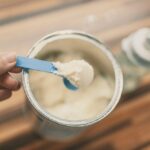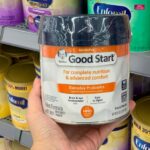Mushrooms are fun and versatile Fungi that makes a delicious addition to any meal. They have a unique and interesting flavor profile and have been a diet staple for centuries, in addition to their medicinal uses.
However, not all varieties of mushrooms are edible and some can be extremely dangerous if consumed. Death cap is an extremely poisonous species of mushroom and Fly Agaric can cause vomiting and cramping when eaten raw.
With this in mind, it is imperative that you choose the right type of mushroom to feed to your baby.
Here we have compiled a guide on which mushrooms are safe to eat, the health benefits, and the possible side-effects of feeding mushrooms to your baby.
Edible Varieties Of Mushrooms
- White button
- Cremini
- Porcini
- Chantrelles
- Portobello
- Morel
- Shiitake
- Oyster
There are over 2000 varieties of edible mushrooms and of these the most popular varieties include the white button mushroom, the cremini, and the portobello.
Most of these popular varieties can be grown at home, however, some wild varieties which are harder to source can be found at some retail stores and farmer’s markets.
View in gallery
Nutritional Information
Mushrooms are highly sought for their savory or umami taste and original nutritional makeup. Each variety has a slightly different makeup and here we’ve compiled the nutritional information for some of the varieties listed above.
Shiitake
A 100 gram serving of shiitake mushrooms contains roughly:
- 55 calories
- 61.7 grams of carbohydrates
- 1.8 grams of fat
- 20 grams of protein
Portobello
A 100 gram serving of portobello mushrooms contains roughly:
- 22 calories
- 3.9 grams of carbohydrates
- 0.4 grams of fat
- 2.1 grams of protein
Oyster
A 100 gram serving of oyster mushrooms contains roughly:
- 33 calories
- 6.1 grams of carbohydrates
- 0.4 grams of fat
- 3.3 grams of protein
Porcini
A 100 gram serving of porcini mushrooms contains roughly:
- 22 calories
- 3.3. grams of carbohydrates
- 0.3 grams of fat
- 3.1 grams of protein
Are Mushrooms Safe For Babies?
Mushrooms are perfectly safe for babies to consume as long as they are purchased from a reputable retail store.
This is extremely important as certain wild varieties can cause stomach upset and discomfort while others can be highly dangerous and even life-threatening.
Ensuring that your mushrooms are safely sourced is therefore very important to ensure a happy and healthy baby.
View in gallery
What Age Is Best To Give A Baby Mushrooms?
There is no precise age that is ideal to give baby mushrooms however most people begin to introduce mushrooms to their baby’s diet around six months old, during the weaning process.
However, some parents choose to wait a little longer, until 10-12 months due to some of the risks associated with eating mushrooms. For the best advice for your baby, it’s worth consulting your pediatrician or family medicine doctor.
You should never feed raw or uncooked mushrooms to your baby. Uncooked mushrooms shouldn’t be eaten by anyone due to the severe health risks that they pose.
Raw mushrooms can cause the person consuming them severe discomfort or even poisoning and so care is highly recommended in their preparation.
When sourced and prepared properly, mushrooms are an excellent addition to any diet, providing your baby with a number of key nutrients. They are also an excellent meat substitute for vegan, vegetarian, or simply health-conscious families.
Health Benefits of Mushrooms For Babies
As we’ve discussed, although mushrooms can be dangerous, they boast an array of health benefits.
Immunity
Mushrooms are great for boosting immunity. They contain bioactive compounds such as polysaccharides and minerals which are known to boost immunity by activating various immune system cells.
Heart health
Fermentable beta-glucan that is found in mushrooms is a fiber that has been linked to improving heart health and boosting cholesterol.
Diets that contain enhanced levels of prebiotics such as these work to reduce conditions such as obesity and cancer and promote a healthier heart overall.
Antioxidant
Studies suggest that mushrooms consumed regularly can have antioxidant effects. In addition to the polysaccharides that mushrooms contain, they also boast various vitamins and minerals which are all effective antioxidants.
Antimicrobial
Mushrooms have been shown to have strong in vitro antimicrobial properties. Mushrooms have also been considered to have strong antiviral properties due to the polysaccharides that they contain, which have immunostimulating abilities.
There is also a potential for mushrooms to boast antifungal activity, although more research is needed to understand the true extent of this.
Health Risks of Eating Mushrooms
There are plenty of great benefits to eating mushrooms, as we’ve discussed. However, there are some risks associated with this dietary staple. One risk associated with mushrooms is the risk of allergy.
Allergies linked to the inhalation of mushroom spores are well-documented. Rarer but still possible cases of allergy have been documented through ingestion.
Due to being antigenically-rich, mushrooms have the ability to boast more than one allergen, and as such should be treated carefully.
Mushrooms can also be highly poisonous if poorly selected, as we’ve discussed. To avoid this, it is essential that you are particular about sourcing your mushrooms and take care to select a well-known and reputable retailer.
The Final Thought
Mushrooms can be a great addition to any diet and are a staple in various cuisines. They can be a delicious and unique flavor profile to add to any dish and are a great source of meat-free protein.
They can be enjoyed by your baby as part of a healthy and balanced diet, however, care should be taken when selecting your mushrooms due to their potentially harmful nature.






